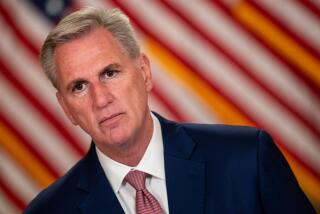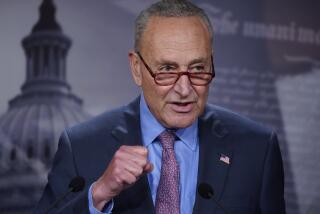Clinton Takes Gamble on Tobacco Accord
- Share via
WASHINGTON — The fate of President Clinton’s most popular new domestic spending programs--child care, medical research and education--hangs on the fragile hope that Congress will pass sweeping tobacco legislation to pay for them.
He is gambling that the appeal of having $65.5 billion to spend on the programs will prod Congress into moving ahead with a deal that leverages payments out of the tobacco industry.
But some members of Congress are already predicting Clinton’s payment strategy will fall flat. As a result, the money for his initiatives would likely have to come from cuts in spending, and the size of the initiatives would be scaled back.
“I can’t imagine that programs to be funded out of a [tobacco deal] will have any impact one way or another on whether that [tobacco] agreement is made up here by the Congress,” Sen. Pete V. Domenici, (R-N.M.), chairman of the Senate Budget Committee, said Monday. “The tobacco settlement has so many problems with members of Congress,” he added.
Even Clinton Budget Director Franklin D. Raines conceded that the administration might have to scale back some of its initiatives: “If the offsets [tobacco payments] are not available you look for additional offsets. If they are not available, you trim your [spending] proposal.”
A Spirited Fiscal Debate Is Expected
Budget experts said the real problem will likely be differences among lawmakers over how to spend the money. That--and an election year in which Congress plans to have all its work done by early October--could make a budget agreement difficult to achieve.
“The real question is: How likely is there to be a consensus on what to do with the money?” said Stan Collender, managing director of Burson-Marsteller’s federal budget policy group.
Calling the GOP “hopelessly divided,” Collender said, “If they decide they want to spend the [tobacco] money, a cry would go up from every Republican office that ‘there’s gold in those hills’ and every one would have a different idea of how to spend it.”
Added Robert D. Reischauer, former director of the Congressional Budget Office: “This is the Democrats’ spending menu; the Republicans are going to have a different menu, and maybe you’ll work out something with a few things from each list.”
As the budget proposal was still being leafed through in Capitol Hill offices, lawmakers were already offering their plans for spending the future tobacco money. Rep. Bill Archer (R-Texas) said he would use it for tax cuts and debt reduction. Sen. Phil Gramm (R-Texas) proposed putting the money into the Medicare Trust Fund to help shore up the program.
Under the administration’s budget, the tobacco companies would pay the government $65.5 billion over the next five years in increments that would result in a gradual increase in the per-pack price of cigarettes.
Per-pack prices would rise (in inflation-adjusted dollars) by an additional 62 cents in 1999, brought up to 82 cents in 2000, 95 cents in 2001, $1.09 in 2002 and $1.24 in 2003. That would bring the total federal tobacco tax, now 24 cents per pack, to $1.63 per pack in 2003. Clinton anticipates that the per-pack price would increase by $1.50 over 10 years.
The money would be divided into three portions: 40% would pay for federal programs; 35% would go to the states to use as they wished; and the remaining 25% would pay for state programs designated by the federal government: enrolling new children in Medicaid, providing child care to working families and hiring additional teachers to reduce class sizes.
Clinton is leaving for Congress the politically sensitive job of determining whether the payments should be called a tax, a licensing fee or some other type of user fee. Similarly, Clinton has made no judgment on whether the payments by tobacco companies should be tax-deductible. If they are, then the total price tag on the deal would have to rise to keep net revenues at $65.5 billion, according to administration officials.
An Effort to Stop Youths From Smoking
The main purpose of the fee would be to raise cigarette prices enough that children would be discouraged from smoking.
“Our goal is to cut youth tobacco use dramatically, and soon,” Secretary of Health and Human Services Donna Shalala said.
Anti-smoking groups said Clinton’s proposal was too little imposed too slowly.
“What we’re asking for is a $2 per-pack immediate increase in cigarette prices,” said Diane Maple, a spokeswoman for the American Lung Assn.
Times staff writer Robert A. Rosenblatt contributed to this story.
More to Read
Get the L.A. Times Politics newsletter
Deeply reported insights into legislation, politics and policy from Sacramento, Washington and beyond. In your inbox twice per week.
You may occasionally receive promotional content from the Los Angeles Times.









